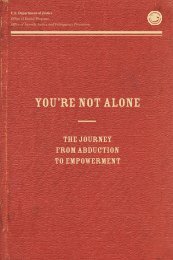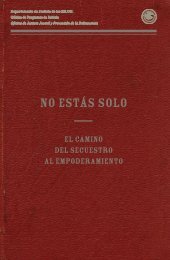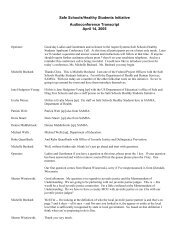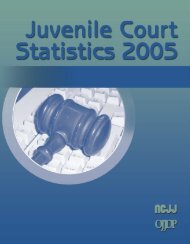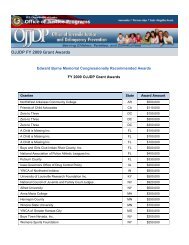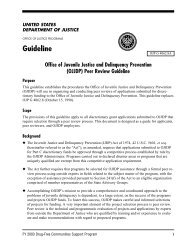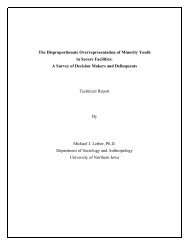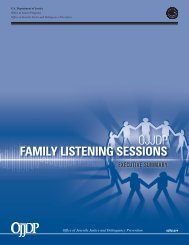OJJDP National Conference Program - Office of Juvenile Justice ...
OJJDP National Conference Program - Office of Juvenile Justice ...
OJJDP National Conference Program - Office of Juvenile Justice ...
You also want an ePaper? Increase the reach of your titles
YUMPU automatically turns print PDFs into web optimized ePapers that Google loves.
Thursday, October 13, 3:15 p.m. – 4:45 p.m.(continued)Scott Peterson, Global Youth <strong>Justice</strong>Moderator: Michael Shader, <strong>OJJDP</strong>Sport-Based Youth Development<strong>National</strong> Harbor 6Lawrence Cann, Street Soccer USALou Bergholz, Doc Wayne Athletic LeagueJustina Sharrock, Coach Across America and Harlem RBIModerator: Paul Caccamo, Up2UsIn this panel presentation, Up2Us (a coalition <strong>of</strong> youth sportsorganizations that use sports as a solution to critical issuesfacing youth) will highlight strategies and programs thathave achieved positive outcomes for hard-to-serve youth—homeless youth; youth in underserved, impoverished communities;and youth in residential mental health treatmentfacilities. These programs use sports as a way to prevent andreduce violence, promote prosocial behavior, and avoid riskybehaviors. Participants will learn about evidence-based bestpractices, tested curriculums and strategies for program delivery,and how to bring human resources to programs usingsports as a way to keep kids safe, happy, and healthy.Promising Examples <strong>of</strong> Judicial Leadership To AchieveDeinstitutionalization <strong>of</strong> Status Offenders<strong>National</strong> Harbor 10Judge David Stucki (retired), Stark County Family Court (Ohio)Judge Joan Byer, Jefferson Circuit Court, Family Trial Division(Kentucky)Judge Karen Ashby, 2nd Judicial District, Denver <strong>Juvenile</strong> Court(Colorado)Moderator: Tara Andrews, Coalition for <strong>Juvenile</strong> <strong>Justice</strong>Three judges who have the statutory authority to securelydetain status <strong>of</strong>fenders under the valid court order exceptionwill discuss why they have chosen to pursue alternativeoptions that achieve both the letter and the spirit <strong>of</strong> thedeinstitutionalization <strong>of</strong> status <strong>of</strong>fenders core requirement<strong>of</strong> the <strong>Juvenile</strong> <strong>Justice</strong> and Delinquency Prevention Act <strong>of</strong>1974, as amended. Workshop participants will learn howjudges in different parts <strong>of</strong> the nation use their statutory andinherent powers to reduce the locked detention <strong>of</strong> youth whocommit status <strong>of</strong>fenses, and even divert those youth fromthe juvenile court altogether.Moving Toward Best Practices for Mentoring: Recentand Ongoing Research on the Moderators <strong>of</strong> <strong>Program</strong>Effectiveness<strong>National</strong> Harbor 11David Dubois, Institute for Health Research and Policy, University<strong>of</strong> Illinois at ChicagoJames Trudeau, RTI InternationalStephanie Hawkins, RTI InternationalThis panel will highlight what is currently known about thebest practices for mentoring programs and will describethree currently funded <strong>OJJDP</strong> mentoring research projects t<strong>of</strong>urther inform the field. The panelists will describe researchon the components <strong>of</strong> a mentoring program that are mosteffective and will identify the components <strong>of</strong> mentoring programsthat can reduce juvenile delinquency and <strong>of</strong>fending.Adolescent Substance Abuse and Treatment<strong>National</strong> Harbor 12–13Randy Muck, Advocates for Youth and Family Behavioral HealthTreatment, LLCCarol A. Schubert, Western Psychiatric Institute and Clinic,University <strong>of</strong> Pittsburgh School <strong>of</strong> MedicineEdward P. Mulvey, Western Psychiatric Institute and Clinic,University <strong>of</strong> Pittsburgh School <strong>of</strong> MedicineJohn F. Kelly, Harvard Medical School, MGH-Harvard Center forAddiction MedicineModerator: Susan Broderick, Georgetown UniversityPresenters will highlight the latest research findings on thenear-epidemic proportions <strong>of</strong> juvenile use and/or abuse <strong>of</strong>alcohol and other substances at younger ages and <strong>of</strong>ferinnovative strategies that can broaden avenues <strong>of</strong> preventionand dispel some myths about certain interventions. Inaddition, presenters will discuss the Pathways to DesistanceStudy and its findings relating to the effectiveness <strong>of</strong> treatmentin reducing both subsequent use and subsequent<strong>of</strong>fending. An overview <strong>of</strong> 12-step programs for youth willexpand the discussion beyond treatment to include issuessurrounding recovery.Ensuring Public Safety Through Successful Reentry—A Developmental Model (Track: Youth in Custody)Potomac 1–3David Altschuler, Johns Hopkins UniversityJudge Denise Cubbon, Lucas County (Ohio)Kevin Shepherd, Ohio Department <strong>of</strong> Youth ServicesRyan Shanahan, Vera Institute <strong>of</strong> <strong>Justice</strong>Moderator: Shay Bilchik, Georgetown UniversityThis discussion will focus on strategies and barriers for thesuccessful reentry <strong>of</strong> juvenile <strong>of</strong>fenders as they transition toadulthood. The focus will be on mainstreaming youth backto the community, school, and into the workforce followingplacement in the juvenile justice system. The session will explainthe need for a strength-based approach that engagesyouth and their families and the need for a strong focuson case management, interventions based on adolescentdevelopment, cognitive behavioral methodologies, educationand employment, and a stable, well-supported transition toadulthood. The panelists will address these issues throughAGENDA AT A GLANCEAGENDA: THURSDAY, OCTOBER 1323



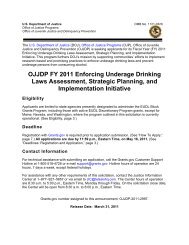
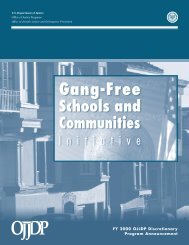
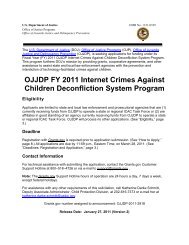
![Chapter 5 [PDF] - Office of Juvenile Justice and Delinquency ...](https://img.yumpu.com/46584340/1/190x245/chapter-5-pdf-office-of-juvenile-justice-and-delinquency-.jpg?quality=85)

